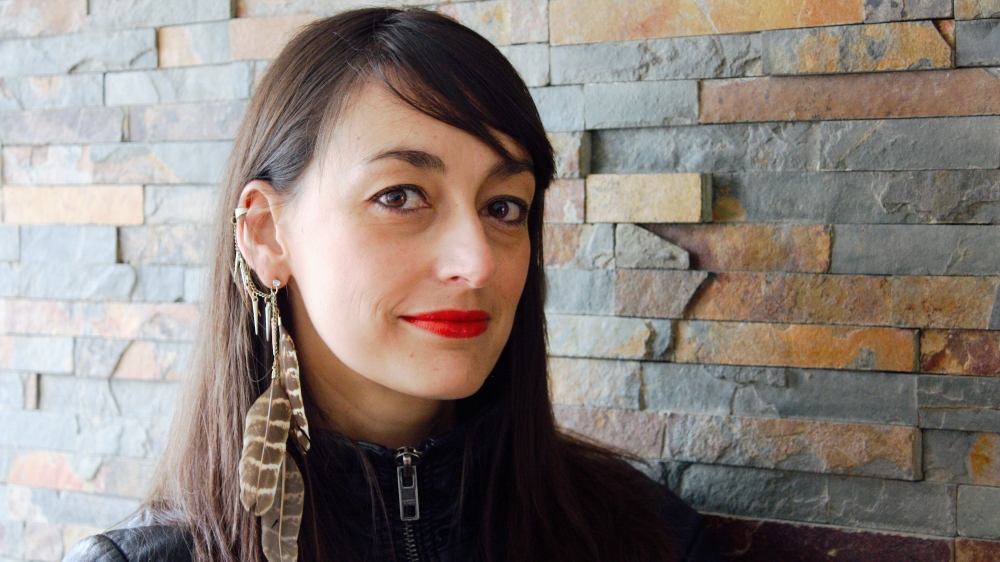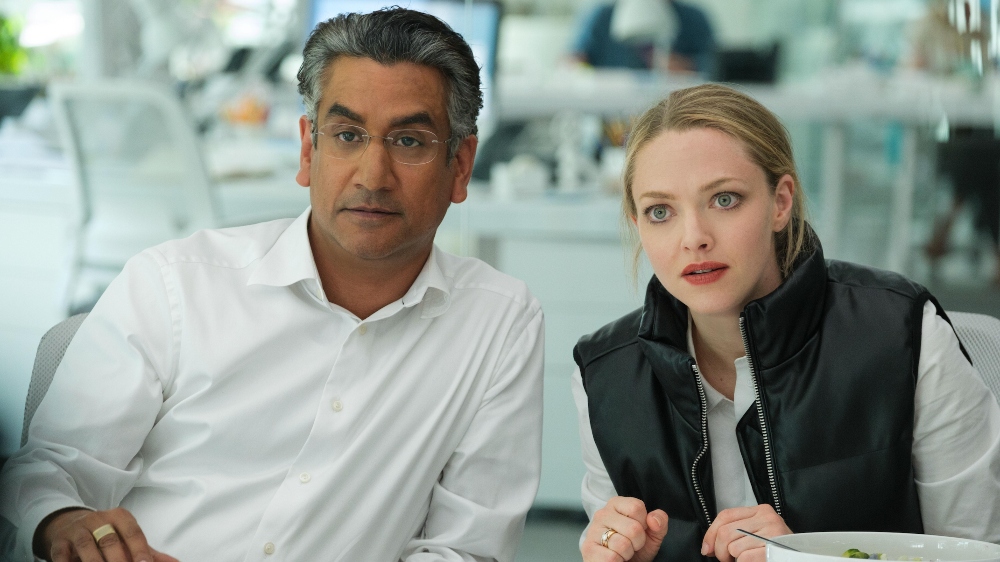
The trial of Theranos founder/CEO Elizabeth Holmes, the wide-eyed, deep-voiced blonde who convinced some of America’s savviest investors to back her biotech company, which promised to make the world a better place with just a single drop of blood, piqued the interest of millions of people — especially the media. Coverage was extensive, and an ABC News podcast set out to make sense of the testimony implicating Holmes, a Harvard dropout who was convicted of criminal fraud.
Some people empathized with Holmes as a young woman facing great pressure to succeed in a male-dominated field, while others saw her as a scientific huckster preying on the public’s worst medical fears. For Hulu’s acclaimed limited series The Dropout, Composer Anne Nikitin didn’t endeavor to sort fact from fiction while composing the music for the eight-episode drama starring Amanda Seyfried as Holmes. In fact, the Theranos case couldn’t have been farther from her radar, as Nikitin lives across the pond near London, England. The 34 cues she created for the series were born out of a methodical directive from creator Elizabeth Meriwether to evoke the emotions of the fictional scene, despite the story being based on truth.
What ultimately worked best was a synth score — a professional first for the Emmy-nominated Nikitin, who is best known for sweeping, orchestral scores. Her musical education began in Canada at McGill University with a bachelor’s degree in Avant-Garde Contemporary Music, followed by a Masters at The Royal College of Music in London for Composition for Screen. It was there that she learned the practicalities of her craft and honed the skill of writing music for movies and television.
Nikitin’s feature credits include Bart Layton‘s American Animals and his BAFTA-winning documentary The Imposter, as well as Netflix’s Lost Girls, and the documentary Untouchable: The Rise And Fall of Harvey Weinstein, which earned her an Emmy nomination. She also composed the score for the upcoming Starz series Dangerous Liaisons and fulfills her dream of scoring for sci-fi with I.S.S.
Nikitin’s affinity for dark, moody, and atmospheric styles served The Dropout well, as did her personal love of indie rock and ’90s electronica. She recently spoke to Below The Line about creating the digital sounds that defined the characters and the various worlds they inhabited. Nikitin found herself going down a rabbit hole of synth sounds and embracing the technical process of making some sounds with everyday household items.

Below the Line: How did you come to create a synth score when you are perhaps best known for orchestral music?
Anne Nikitin: I have worked with synthesizers before but only in the way that it would support the orchestra. I’m more comfortable with orchestral instruments or even rock band instruments — guitars and things. But synths, I wasn’t as comfortable with, but I always put them in because I love them, but [they] have never been a main focus until now. The idea for the music was not supposed to be a synth-based score when I took on the job. I’m not sure they would’ve hired me if they knew what they wanted because I’m not really known for synth music. It seemed to be a very organic process and it seemed to work out really well between me and the showrunner, Liz Meriwether. It was a little bit intimidating at first, but I just used synths in the way that I felt comfortable, and [I] really enjoyed it, actually. I just loved the process.
BTL: What was the reasoning behind using a synth score?
Nikitin: At the very beginning, we were discussing ideas whereby the characters would have sort of a string-based or more organic-based score, and then for the science world, we would go into the synth world. It was an obvious idea and so I decided to write a whole kit of music, and within that mix, I’d written this one track called “Beijing,” which was just me messing around not thinking anything of it. I read the scene and it’s where she [Holmes] goes to Beijing for the first time and is sort of lost and disorientated. I thought, ‘I’ll just write something weird and they’ll probably say “no.”‘ Then Liz went, ‘this is it, this is the sound of the show.’ It was just really simple, with a baseline and stuff thrown on top, and it became the theme, so I started developing this idea and the sound.

BTL: Where did the inspirations come from to create those synth sounds?
Nikitin: The inspiration came when I started to talk to the director and to Liz Meriwether where we were having brain dumps on Zoom. When I saw the first rough cut of the edit, I started thinking about the science route, and different locations like the labs, and then trying to understand where Elizabeth comes from and what she’s doing and where she’s going with this. There’s a little bit of a sympathetic edge to the show, trying to show her in a kind of human light because she’s incredibly robotic in many ways. I was trying with elements of the music just to make her a bit more of a rounded character and not just this greedy, evil archenemy. I was inspired by all the different aspects of her and all the people around her [who] become the victims of her world and tried to give them themes and motifs that you can tinkle away or latch onto as an audience.
BTL: What were those synth themes that illustrated the characters?
Nikitin: For “Sunny and Elizabeth,” I have a punch of prayer bowls actually here behind me, and I got somebody to sample them for me and build me a library. I was able to use those in a more synthetic way and I was enjoying taking real sounds as well and creating sort of a synth, plastic-y feel about them. There’s something about their relationship in that it’s real and there is love there but it’s also very manipulative and there’s a veneer all the time. I tried to create that with that instrumentation. Erika (Camryn Mi-young Kim) has a specific theme as the whistleblower as well when she starts to uncover what Elizabeth is doing. For her theme, “Iron Sisters,” which was a darker score, I was using percussive synths, creating a quite quirky world where nobody is believing her and she can’t quite get anybody to listen to her.

BTL: Did you think of the meteoric rise and fall of Elizabeth Holmes while you were composing the score?
Nikitin: In the beginning, you think of this innocent girl who had this weird infatuation with Silicon Valley and Apple. She’s driven and she’s clearly smart and you can’t believe it leads to that outcome. She could only fall because who could sustain that, and [she] has had her comeuppance, thankfully.
BTL: How did you create the sounds for the “Walgreens Men” and Stephen Fry’s character Ian Gibbons?
Nikitin: For the Walgreens guys, I used a drum kit, but then I was using the synth kit and adding synth cowbells and just making it quite funny. More cowbell! My assistant was laughing at my cowbell usage but it seemed to work. For Ian Gibbons, I wanted [to use] a little more sympathetic motif that was a pure synth-based world but give him a more emotional quality. A patch was one of the synths that I used.
BTL: Can you give examples of how you created the sounds for some of the cues?
Nikitin: For “Faked the Demo,” they wanted something very dark [that] had elements of my old score for American Animals, where I pushed synths for the first time to that degree. It’s in The Dropout vein of real characters doing bad things and their rise and fall. For that, it was a real mix of orchestra and synth, but for “Faked the Demo,” they didn’t want any of the orchestral stuff.
For introducing “Mr. Schultz” that was a synth harp, and then I was adding various delays to that to give it a loopy but kind of mellow feel to give Mr. Schultz (Sam Waterston) kind of a softer edge. In this series, you kind of feel for him and his grandson. Harp is one of my favorite instruments to write for and I tend to use it all over my scores, and in this one, I used a synth homage to the harp and he was the perfect character for that instrument.

BTL: What were your favorite synth-based sounds?
Nikitin: I got a Roland D50, which was really nice. I also was using a mellotron. I loved using plug-ins and adding weird delays and phasers to these sounds [so] that I could manipulate them in a way that was suitable. I definitely have a few go-to favorites, but I also found that you can spend days and days just auditioning sounds. There are a million different options, whereas for a violin or a piano, you’ve just got the sound and then you manipulate it in different ways, but there’s a limit to what you can do.
BTL: Did you miss working with real instruments?
Nikitin: I found the synth world very versatile. You could create these hugely emotional pieces of music without needing pianos or violins, which [was] really refreshing for me to understand and [to] explore that. You could go to the harder techno side or the really plastic-y feel as well. I really loved it and it was really fun. I’ve always loved how they looked and always wanted to be a synth tech-head. I just don’t have that kind of brain. I’m so not technical, but I thought, I’ll just get rid of all of the baggage that comes with the snobbery and what gear are you using. I thought, ‘I don’t really care.’ I love music and I love synth music but I’ve never been one that says, “oh, they used that drum machine.” I just know what I like and I loved experimenting. I’d grab onto a sound that I thought would be suitable, that worked for a certain character or a certain moment, and just went with that. If [you] want to write an orchestral piece, you can get there because you know what instruments do and what their function is in the orchestra, whereas with synths, it’s just a limitless world. You can just waste away your hours listening thinking, ‘this is really cool.’
The Dropout is now streaming in its entirety on Hulu.





